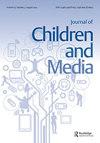The road to addiction (might be) paved with good intentions: motives for social media use and psychological distress among early adolescents
IF 2.1
3区 心理学
Q2 COMMUNICATION
引用次数: 0
Abstract
ABSTRACTRelying on an extended functionalist perspective, in the present study we investigated how motives underlying social media use (i.e., conformity, social/the need for social relationships), coping (the need for mood regulation), and defensive motives (anti-mattering, i.e., the feeling of not mattering to others) are linked to early adolescents’ psychological distress. We also evaluated the potential mediating role of social media addiction in the relationship between social media use motives and psychological distress in vulnerable social media users, i.e., early adolescents. Our sample consisted of 480 middle-school Romanian students (M = 12.03, SD = .78, 52.3% females). The results suggested that social relationships, mood regulation, and anti-mattering motives were positively associated with social media addiction, and that social media addiction was positively related to psychological distress. Anti-mattering and mood regulation were positively associated with psychological distress. Furthermore, social media addiction mediated the relations between the motives for social media use and psychological distress. Finally, we discuss the theoretical and practical implications of the findings for knowledge, prevention, and interventions regarding social media addiction among early adolescents.IMPACT SUMMARYPrior State of Knowledge The functionalist theoretical perspective states that social media addiction might be explained by underlying motives. Previous studies also highlight the necessity to explore the relation between these motives, social media addiction, and psychological distress among youth.Novel Contributions We tested an extended functionalist perspective of social media addiction and explored the potential mediating role of social media addiction on the relationship between social media use motives (conformity, social relationships, mood regulation, anti-mattering) and adolescents’ psychological distress.Practical Implications Our results are helpful for interventions concerning social media addiction among adolescents. Knowing the motives that are related to social media addiction might help in the design of effective, targeted, parental and educational interventions to prevent adolescents’ social media addiction and psychological distress.KEYWORDS: Social mediamotives for social media useaddictionadolescentsdistress AcknowledgmentsThis work was supported by a grant of the Romanian Ministry of Education and Research, CNCS - UEFISCDI, project number PN-III-P4-ID-PCE-2020-2963, within PNCDI III.Disclosure statementThe authors declare no financial interests/personal relationships which may be considered potential competing interests.Authors’ contributionBoth authors equally contributed to the present paper.Ethics statementThis study’s protocol was designed in concordance with ethical requirements specific to the Faculty of Psychology and Educational Sciences, `Alexandru Ioan Cuza` University (Iasi, Romania), before beginning the study and being supervised by Loredana Diaconu-Gherasim. All participants voluntarily participated in the study and gave written, informed consent following the Declaration of Helsinki and the national laws of Romania regarding ethical conduct in scientific research, technological development, and innovation.Additional informationFundingThe work was supported by the Romanian Ministry of Education and Research [CNCS - UEFISCDI, PN-III-P4-ID-PCE-2020-2963].Notes on contributorsAlexandra MafteiAlexandra Maftei, PhD is an assistant professor at the “Alexandru Ioan Cuza” University of Iasi, Romania, Faculty of Psychology and Education Sciences. Her area of interests includes social, educational, and clinical psychology.Loredana R. Diaconu-GherasimLoredana R. Diaconu-Gherasim, PhD, is a Professor at the Department of Psychology and Educational Sciences, Alexandru Ioan Cuza University of Iasi, Romania. Her research focuses on mental health and the impact of individual and contextual factors on the emotional development of youth.成瘾之路(可能)是由良好的意图铺就的:社交媒体使用的动机和早期青少年的心理困扰
摘要基于扩展功能主义的视角,本研究探讨了社交媒体使用的动机(即从众、社会/社会关系需求)、应对(情绪调节需求)和防御动机(不重要,即对他人不重要的感觉)与早期青少年心理困扰的关系。我们还评估了社交媒体成瘾在弱势社交媒体用户(即早期青少年)的社交媒体使用动机和心理困扰之间的关系中的潜在中介作用。我们的样本包括480名罗马尼亚中学生(M = 12.03, SD = 0.78, 52.3%为女性)。结果表明,社交关系、情绪调节和反物质动机与社交媒体成瘾呈正相关,社交媒体成瘾与心理困扰呈正相关。反物质和情绪调节与心理困扰呈正相关。此外,社交媒体成瘾在社交媒体使用动机与心理困扰之间起中介作用。最后,我们讨论了这些发现对早期青少年社交媒体成瘾的知识、预防和干预的理论和实践意义。功能主义理论观点认为,社交媒体成瘾可以用潜在动机来解释。先前的研究也强调了探索这些动机、社交媒体成瘾和青少年心理困扰之间关系的必要性。本研究从扩展功能主义视角检验了社交媒体成瘾,并探讨了社交媒体成瘾在社交媒体使用动机(从众、社会关系、情绪调节、反物质)与青少年心理困扰之间的潜在中介作用。我们的研究结果对干预青少年社交媒体成瘾有帮助。了解与社交媒体成瘾相关的动机可能有助于设计有效的、有针对性的父母和教育干预措施,以预防青少年的社交媒体成瘾和心理困扰。本研究得到罗马尼亚教育和研究部(CNCS - UEFISCDI)的资助,项目编号PN-III-P4-ID-PCE-2020-2963,属于PNCDI III。披露声明作者声明没有可能被视为潜在竞争利益的经济利益/个人关系。两位作者对本文的贡献相同。伦理声明本研究的方案是在研究开始之前,由Loredana Diaconu-Gherasim监督,按照Alexandru Ioan Cuza大学(罗马尼亚雅西)心理与教育科学学院的特定伦理要求设计的。所有参与者都遵循赫尔辛基宣言和罗马尼亚关于科学研究、技术开发和创新中的道德行为的国家法律,自愿参与研究并给予书面知情同意。这项工作得到了罗马尼亚教育和研究部的支持[CNCS - UEFISCDI, PN-III-P4-ID-PCE-2020-2963]。作者简介:alexandra mattei,博士,罗马尼亚雅西“Alexandru Ioan Cuza”大学心理与教育科学学院助理教授。她的研究领域包括社会、教育和临床心理学。Loredana R. Diaconu-Gherasim,博士,罗马尼亚亚西亚历山德鲁·伊安·库扎大学心理与教育科学系教授。她的研究重点是心理健康以及个人和环境因素对青少年情感发展的影响。
本文章由计算机程序翻译,如有差异,请以英文原文为准。
求助全文
约1分钟内获得全文
求助全文

 求助内容:
求助内容: 应助结果提醒方式:
应助结果提醒方式:


